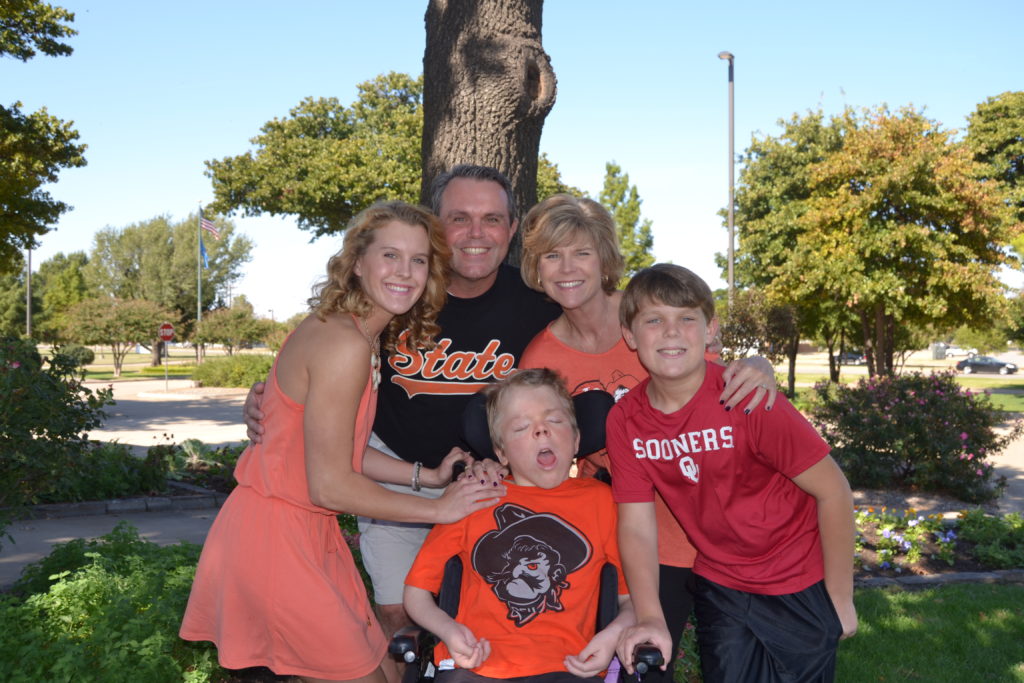It’s been several years since Angela and Byron first encountered the unexpected on a routine trip to Target and a lot has happened since then.
They are no longer living in Dallas, instead, they’ve moved to Oklahoma to be closer to family.
They have another son and are now a family of five. Davis has been officially diagnosed with hypomelanosis of Ito (HMI) and he is on the severe end of the spectrum.
He is attending his local elementary school and although he is in a wheelchair and non-verbal, he’s managed to form a connection with the kids at his school. In fact, he’s become a minor celebrity and gets greeted by kids wherever he goes.
Balancing
Of course, Davis isn’t an only child, he has an older sister and younger brother as well. The challenge faced by all families who have more than one child is to make sure each child’s needs are met. That each child has opportunities to flourish and thrive and no one child hoards all the attention.
In Angela’s case, there’s always the potential for Davis’ needs and challenges to overtake everyone’s lives. It would be so easy to live in a Davis bubble, where Davis was the center of the family and everyone revolved around his needs. It’s a natural rabbit hole to fall down which is why balance is so important.
Angela worked hard to make sure her family, particularly her other two kids, lived as ‘normal’ a life as they could within their normal. It’s a delicate balance between not ignoring Davis’ disability but also not being smothered by it. Because if you swing a little too far in either direction, it’s an unhealthy way to live.
One way Angela ensured there was a healthy balance was to make sure each of her kids got an opportunity to shine. This meant her other two kids were involved in baseball or gymnastic events and Davis was there on the sidelines in his wheelchair, supporting his siblings.

Balancing parental needs versus child’s needs
But balance isn’t restricted to sibling relationships, it’s also important in the parent/child relationship. Specifically, balancing parental needs with what’s in the best interest of the child. This often means letting go of our measuring sticks and picking up new ones. But Angela was discovering some measuring sticks are hard to let go of. The one she was struggling with letting go of was her definition of family. For her, family meant having everyone close.
However, it was getting harder and harder to ignore the fact her definition of family needed to change because as Davis got older he began to have more health issues. The level of care he needed was getting more complex. By the time he was 12 years old, Angela and Byron were providing round-the-clock care for their son because he needed breathing treatments every 4 hours. Angela was taking the night shift while Byron took the early morning shift. They even cared for Davis in a full-body suit for 5 weeks after he had bilateral hip replacement surgery.
After all this is what family means. It means supporting each other, whether that means cheering each other on during sporting activities or taking care of a sick child. Families roll up their sleeves and do what needs to be done and this is exactly what Angela and Byron did. There was no discussion and it wasn’t up for debate. Davis was their son and they took care of him.
Bethany Children’s Health Center
Of course, there were times when Davis couldn’t come home to recover, like when he had a spinal fusion in 2009. He had to spend a month in rehab at Bethany Children’s Health Center.
Angela and Byron were so impressed by the level of care Davis received at the Children’s Health Center, that they signed him up for respite there as well. So in the summer of 2010, Davis went to respite at Bethany Children’s Health Center, or ‘Davis’ Camp’ as the family called it while the rest of the family went on a staycation. It was such a pleasant experience for everyone that Angela signed Davis up for respite again the following summer.
Davis’ respiratory issues
But in early 2012 Angela could no longer hold onto her definition of family, it was slowly slipping out of her grasp. Actually, it started in December 2011 when Davis’ health took a drastic turn.
He had empyema, one from which he almost died. Empyema is the collection of pus between the lung and the pleural cavity. It caused Davis’ lungs to collapse and he had to have surgery to reinflate it. He was put on a ventilator for four days to give his lungs time to heal so they would be able to hold air again. Thankfully, God had other plans and Davis recovered. However, his battle with respiratory illness would continue all through the spring of the following year.
The social worker had already made the suggestion Davis would benefit from being in a full-time residential care facility. As it happens, Bethany Children’s Health Center (where Davis was already receiving some of his therapies and going for respite the past two summers) also provided full-time residential care.
The thought her son would not be living at home was not one Angela wanted to entertain. After all, her passion is family and family meant having everyone close. She was not ready to let go of that measuring stick just yet.
Unfortunately, it would take a significant health emergency for Angela to realize, that she needed to let it go. This is what happened in 2012.
Letting go of the measuring stick
Both Angela and Davis wound up in different hospitals at the same time. They were both battling major health issues. It was at this point that Angela realized something needed to change. She could not take care of herself and Davis at the same time. She realized she was burned out and she could not continue to take care of Davis and still be healthy. The type and level of care Davis needed was beyond what she (or Byron) could provide. It was getting to the point where it was not only affecting Davis’ health but Angela’s as well.
Reluctantly, she took the social worker’s advice. At the time there were no openings for full-time residential care but there was a waiting list. Angela went ahead and put Davis’ name on the waiting list. The stipulation being if his name came up and she wasn’t ready she could decline and wait for another opening.
A full-time bed became available in July of that year. So after living at home for 14 years, Davis began living at Bethany Children’s Health Center full-time.
A new definition of family
Not only did Angela have to say goodbye to her son but she also had to let go of her definition of family. Keeping Davis at home was what she wanted. But providing the help and care Davis needed in addition to taking care of her own health was not feasible.
She realized she had to balance her expectations and desires with what was best for Davis. It definitely wasn’t an easy decision. Yet, she looks at Davis and how far he’s come and realizes it was the best decision for him. She also realizes it was a decision she should’ve made long ago.
She’s also accepted the fact her version of family is different than most people’s but that’s okay. It’s her normal and there’s nothing wrong with that.
Life is about adapting, letting go of old ideas and ways of doing things, and embracing the new. That’s the only way we grow and move forward.
Angela successfully jumped over one hurdle but in a few short years, she would face another.
